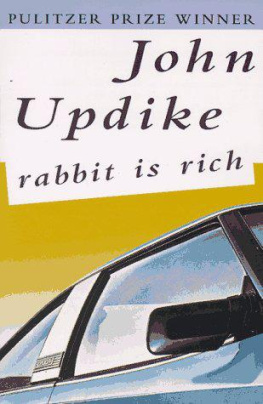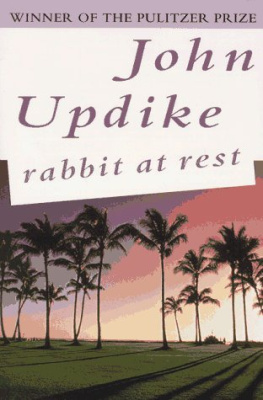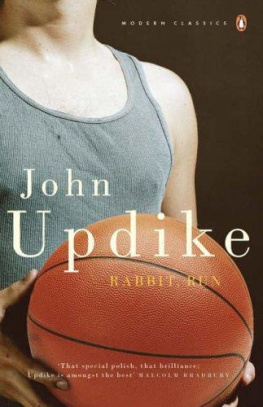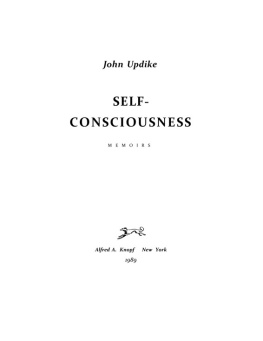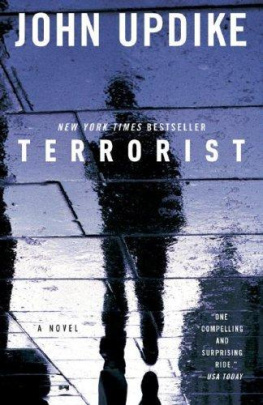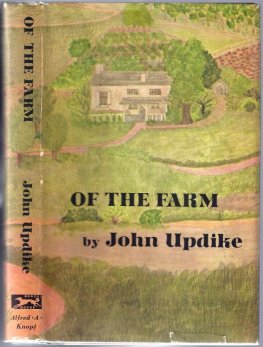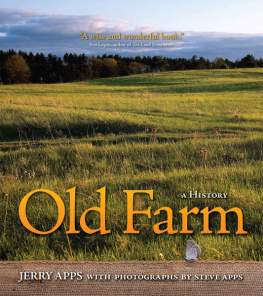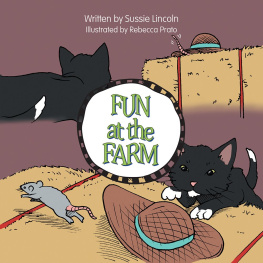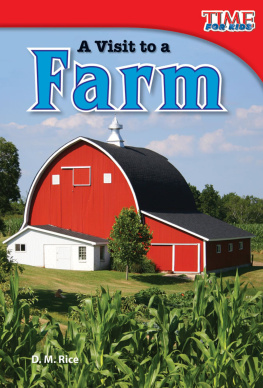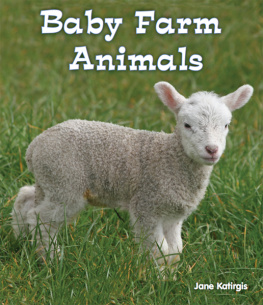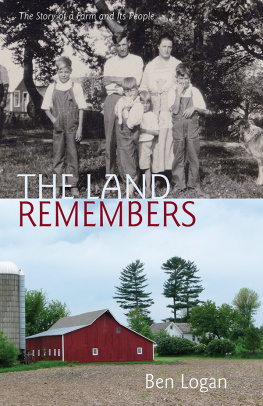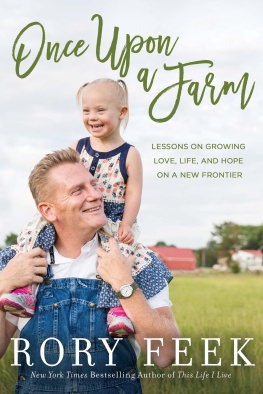John Updike

OF THE FARM
Ballantine Books New York
Consequently, when, in all honesty, I've recognized that man is a being in whom existence precedes essence, that he is a free being who, in various circumstances, can want only his freedom, I have at the same time recognized that I can want only the freedom of others.
Sartre
OF THE FARM
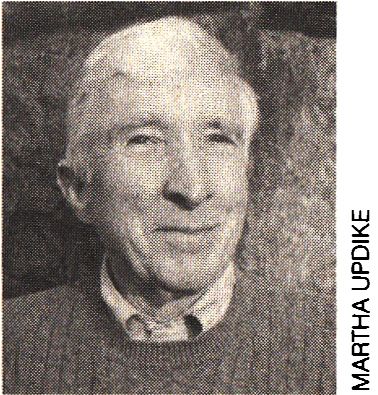
About the Author

JOHN UPDIKE was born in 1932, in Shillington, Pennsylvania. He graduated from Harvard College in 1954 and spent a year in Oxford, England, at the Ruskin School of Drawing and Fine Art. From 1955 to 1957 he was a member of the staff of The New Yorker. His novels have won the Pulitzer Prize, the National Book Award, the American Book Award, the National Book Critics Circle Award, the Rosenthal Award, and the Howells Medal. He died in 2009.

We turned off the Turnpike onto a macadam highway, then off the macadam onto a pink dirt road. We went up a sharp little rise and there, on the level crest where Schoelkopfs weathered mailbox stood knee-deep in honeysuckle and poison ivy, its flopped lid like a hat being tipped, my wife first saw the farm. Apprehensively she leaned forward beside me and her son's elbow heavily touched my shoulder from behind. The familiar buildings waited on the far rise, across the concave green meadow. "That's our barn," I said. "My mother finally had them tear down a big overhang for hay she always thought was ugly. The house is beyond. The meadow is ours. Schoelkopf's land ends with this line of sumacs." We rattled down the slope of road, eroded to its bones of sandstone, that ushered in our land.
"You own on both sides of the road?" Richard asked. He was eleven, and rather precise and aggressive in speech.
"Oh sure," I said. "Originally Schoelkopfs farm was part of ours, but my grandfather sold it off before moving to Olinger. Something like forty acres."
"How many did that leave?"
"Eighty. As far as you can see now, it belongs to the farm. It's probably the biggest piece of open land left this close to Alton."
"You have no livestock," Richard said. Though I had told him there was none, his tone was accusatory.
"Just some dogs," I said, "and a barn full of swallows, and lots of woodchucks. My mother used to keep chickens before my father died."
"What's the point," Richard asked, "of a farm nobody farms?"
"You'll have to ask my mother." He was silent a moment, as if I had rebuked himI had not meant to. I added, "I never understood it myself. I was your age when we moved here. No, I was older. I was fourteen. I've always felt young for my age.
Then he asked, "Whose woods are all these?" and I knew he knew my answer and meant me to give it proudly.
"Ours," I said. "Except for the right-of-way we sold the power line twenty years ago. They cut down everything and never used it. There, you can see the cut, that strip of younger trees. It's all grown up again. They cut down oaks and it came up maples and sassafras."
"What's the point," he asked, "of a right-of-way nobody uses right away?" He laughed clumsily and I was touched, for he was making a joke on himself, trying to imitate, perhaps, my manner, and to unlearn the precocious solemnity his fatherless years had forced on him.
"That's how things are down here," I said. "Sloppy. You're lucky to live in New York, where space is tight."
Peggy spoke. "It does seem like a lot of everything," she said, of the farm skimming around us, and brushed back her hair from her forehead and cheeks, a gesture she uses after any remark that might meet opposition, as a man would push back his sleeves.
It was truewhenever I returned, after no matter how great a gap of time, to this land, the acres flowed outward from me like a form of boasting. My wife had sensed this and was so newly my wife she thought it worth correcting. This instinct of correction in her was precious to me (my first wife, Joan, had never criticized me at all, which itself seemed a deadly kind of criticism) but I dreaded its encounter with my mother.
Joan in her innocence had once gently suggested that my mother needed a washing machine. She had never been forgiven. My instinct, now, in these last moments before my mother was upon us, was to talk about her aloud, as if to expel what later must be left unsaid.
"Richard," I said, "there is a tractor. It drags a rotating cutter bar behind it that cuts the hay. It's the law in Pennsylvania that if your farm is in soil bank you must cut your weeds twice a summer."
"What's soil bank?"
"I don't know exactly. Farms that aren't farmed."
"Who drives the tractor?"
"My mother."
"It'll kill her," Peggy said harshly.
"She knows it," I said, as harshly.
Richard asked, "Can I drive it?"
"I wouldn't think so. Children do it around here, but they get"I rejected the word "mangled"; a contemporary of mine had had his pelvis broken, and I envisioned his strange swirling limp"hurt once in a while."
I expected him to insist, but he was distracted. "What's that?" The pink ruin had flashed by in the smothering greenery.
"That's the foundation of the old tobacco shed."
"You could put a roof on it and have a garage."
"It burned down forty years ago, when somebody else owned the farm."
Peggy said, "Before your mother bought it back?"
"Don't put it like that. She thinks now that my father wanted to buy it back too."
"Joey, I'm frightened!"
Her exclamation coincided with the blind moment when I negotiated the upward twist in the road that carried us around the barn. A car hurtling down the road heedlessly would be hidden long enough to produce a collision. But in the thousands of times I had risked it, it had never happened, though the young locals out in their jalopies liked to speed along our stretch, to tease the dogs and to annoy my mother. At night they sometimes roamed the fields in pick-up trucks, spotting deer with their headlights. It was dusk now. I pulled safely around the barn, parked on its ramp, which was grassy with disuse, and told Peggy, "Don't be. I don't expect you and she to get along. I thought she would with Joan but she didn't."
"And she has less reason to like me."
"Don't think that. Just be yourself. I love you."
But the declaration was given hastily, with a jerky pat of her thigh, for already my mother's shape, a solid blur, had emerged from the house and was moving through the blue shadow of the hemlock that guarded the walk. It was this tree that brought evening into the house early; many times at this hour as a boy I had been surprised, looking out of the window, thinking night had arrived, to see sunlight like raw ore still heaped on the upper half of the barn wall. With a guilty quickness I opened the car door and waved and hailed my mother: "Hi-i!"
"Pilgrims!" she called back, a faint irony barely audible in the strange acoustics of the engine's silence, as our Citroen hissingly settled through its cushions of air.
I was shocked by how slowly she moved along the walk. I had seen her outrace my father from the barn to the house in the rain. She suffered from angina and, though she had never smoked, emphysema. The great effort of her life had been to purchase this farm and move us all to it, but her lungs, the doctor told her, were those of a hardened city-dweller. Against the August damp she wore a man's wool sweater, my grandfather's, gray and ribbed and buttoned down the front, over an old pink blouse I associated with childhood Easters. The collie pup, the only dog not in the pen, kept dashing at us, barking and bristling a few feet from the piscine face of the Citroen, and then racing back to my mother. He nipped at her agonizing slowness of step; the pallor of his throat and tail-tip scudded in the gloom of the lawn. The lawn was tall with plantain and sadly needed cutting.
Next page

